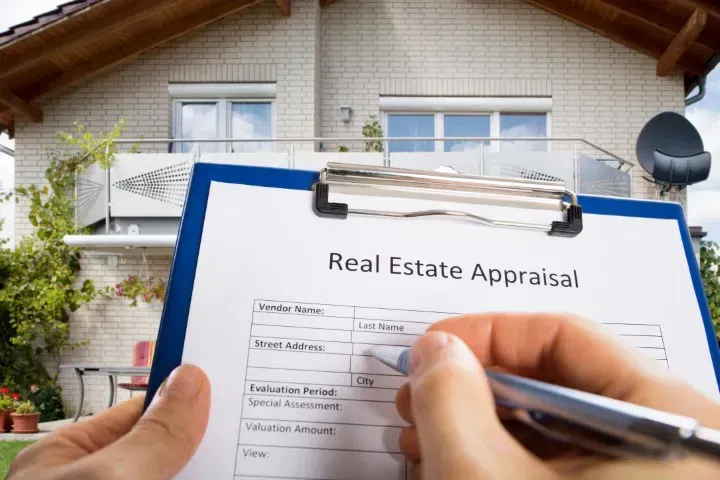What is an Appraisal?
Let's explain what an appraisal is, its importance in real estate transactions, and how it impacts buying, selling, and financing decisions.
Schedule Your Home Appraisal Today
What is an Appraisal and Why Do I Need One?
When it comes to buying or selling a home, understanding the value of the property is crucial. This is where a real estate appraisal comes into play. An appraisal provides an objective assessment of a home's value, conducted by a professional appraiser. But why is this so important? Let's look into the details.
When Selling a Home, an Appraisal in New Haven Will Likely Be Part of The Process. More About Appraisals:
When ordering an appraisal, you are requesting an unbiased estimate showing the value of a property, provided by a certified appraiser. This estimate is based on a variety of factors including the property's condition, location, and sales details of similar properties that have recently sold. According to the Uniform Standards of Professional Appraisal Practice (USPAP), the process involves thorough research and analysis to ensure an accurate appraisal.
Request a Quote
We will get back to you as soon as possible.
Please try again later.
Why Do I Need an Appraisal for My New Haven, CT Property?
There are several scenarios where an appraisal is necessary. When purchasing a home, the local mortgage lender requires an appraisal to ensure they are not lending more money than the home's value. The home serves as collateral for the loan, so the lender needs to be confident in its worth.
When selling a home, knowing your home's true value helps you set a realistic price. If you're refinancing, an appraisal can help you qualify for a better mortgage rate. Appraisals are also used for property tax assessments and appeals, ensuring you are not overpaying on property taxes. Lastly, accurate appraisals are crucial for dividing assets fairly in estate planning and divorce settlements.

How Do Home Appraisals Work?
The appraisal process typically begins when it is ordered by a national mortgage company, a buyer, or a seller. Here’s a step-by-step breakdown of how it works:
The appraisal process typically begins when a mortgage lender, buyer, or seller orders it. Here’s a step-by-step breakdown of how it works:
Step 1: Assignment
A licensed appraiser is chosen to evaluate the property.
Step 2: Research
The appraiser looks up information about the property in public records and studies the local housing market.
Step 3: Onsite Evaluation
The appraiser visits the property to inspect its condition, features, and any improvements or upgrades.
Step 4: Comparable Sales Analysis
The appraiser uses the Sales Comparison Approach, which involves collecting information on recently sold homes that are similar to the house being appraised. These homes are chosen based on their location, size, room count, age, condition, upgrades, site size, view, and amenities such as a spacious kitchen or a cozy backyard patio . The appraiser finds these comparable homes by researching the Multiple Listing Service (MLS) and Tax Records.
5: Report Compilation
The appraiser gathers all the information and writes a detailed report. This report includes the appraised value of the property and the data used to reach that conclusion. Positive and negative adjustments are made to the comparable sales for differences between them and the property being appraised. The appraiser reconciles these adjusted values to determine the final home appraisal value.
What is Included in an Appraisal Report?
A home appraisal report is a detailed document that provides an unbiased estimate of a property's value, essential in real estate transactions. It includes interior and exterior photos to assess the property's condition and upgrades. For instance, when listing a home in New Haven, the report also contains comparable sales, featuring at least three recent sales from the local area with photos, and a location map showing the subject property in relation to these comparables.
The appraised value, which is the professional estimate of the property's worth, is highlighted along with the appraiser’s credentials, including state license or certification details. During the appraisal process, a licensed home appraiser visits the property to look at specific details. For example, they measure the square footage to see how big the house is. They count the number of bedrooms and bathrooms.
They note the design of the house, such as if it is a Craftsman-style home. They check the age and type of the heating and cooling system (HVAC). They also inspect amenities like the fences, gates, multi-car garages, and any other special features. For instance, if the property has a pool, they will inspect the condition, noting if it’s well-maintained or needs repairs. They will also examine the garage to see if it’s in good shape and if it has enough space for cars and storage. All these details help the appraiser determine the property’s value. Learn more about the nitty gritty of what appraisers look for on this page.
The report integrates these findings with local market data and trends, ensuring buyers know if they are paying a fair market price. This process helps maintain a stable housing market and ensures lenders can accurately calculate loan-to-value ratios, protecting them from over-lending.
Who Needs a Property Appraisal?
Various individuals and entities may require a property appraisal, including:

Homeowners and Buyers
Homeowners might need an appraisal when selling their home to find out its current market value. Buyers need an appraisal to make sure they're not paying too much for a property. If someone is refinancing their mortgage, an appraisal helps to determine the new loan amount.
Attorneys
Lawyers may need appraisals for various legal reasons, like divorce settlements where property value needs to be divided fairly, in bankruptcy cases to determine the value of assets, or for estate planning to value a deceased person's property.
Mortgage Lenders and Brokers
Banks and other lenders need an appraisal to ensure the property’s value supports the loan amount. This helps them decide how much money they can safely lend to the buyer.
Real Estate Agent
Agents use appraisals to set accurate pricing for homes on the market. Knowing the true value helps them create effective marketing strategies and attract potential buyers with a fair and competitive price.
The Importance of Accurate Appraisals
Accurate appraisals are critical in residential real estate transactions to ensure fair market value. For instance, if you're listing a home for sale, a precise appraisal can help you avoid selling it for too little or paying too much for a new property. For lenders, accurate appraisals minimize the risk of loan defaults by ensuring the loan amount aligns with the property's worth. This helps both buyers and sellers make informed decisions and maintain a stable housing market.
What If the Appraisal Comes in Low?
If the appraised value is lower than the loan amount, the buyer has several options:
- They can increase the down payment to cover the difference between the appraised value and the loan amount.
- They can negotiate with the seller and ask for a price reduction.
- If there's an appraisal contingency, the buyer can terminate the contract and retain their deposit.
- They can request a reconsideration of value (ROV) by challenging the appraisal with additional data.

Historical Context of Real Estate Appraisals
The concept of real estate appraisal dates back thousands of years. For example, in the Land of Canaan, leaders from the twelve tribes of Israel were sent to assess the land's value. They were chosen for their integrity and judgment, highlighting the long-standing importance of fair home valuations.
In the United States, the first recorded appraisal was in 1626, when the Dutch West India Company appraised land in New Amsterdam (now New York City) for tax purposes. This early practice laid the groundwork for modern appraisal methods.
Property Appraisal in New Haven
Understanding real estate appraisals is essential for anyone involved in buying, selling, or refinancing a home. An accurate appraisal ensures fair transactions and protects both buyers and lenders from financial risk. If you need a property appraisal in New Haven County or the surrounding areas, call our appraisal associates. Our certified property appraisers are dedicated to providing accurate, reliable appraisals to help you make informed real estate decisions.

